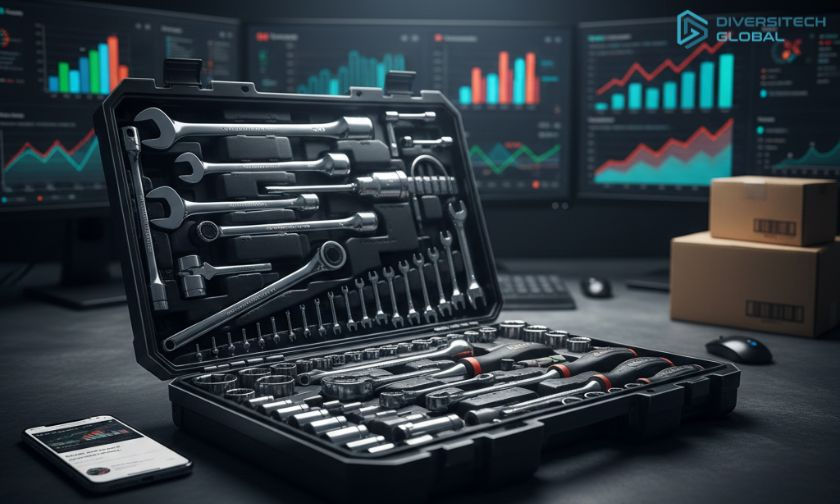Private Labeling Tool Boxes Made in China
- Diversitech Global

- May 7, 2024
- 5 min read
Updated: May 8, 2024

The global tool industry has seen a significant shift towards customization and brand differentiation, especially within the realm of tool storage solutions. This trend is largely fueled by businesses seeking to elevate their brand presence and loyalty through private labeling. Key players in this evolving market landscape are the toolbox manufacturers in China. These manufacturers have adeptly positioned themselves as pivotal partners for brands looking to offer high-quality, customized toolboxes under their own labels. The flexibility, efficiency, and innovation offered by Chinese manufacturers make them an attractive option for companies aiming to expand their product lines with private label toolboxes.
The practice of partnering with a toolbox manufacturer in China for private labeling purposes offers a plethora of advantages, including access to state-of-the-art manufacturing facilities, cost-effective production, and rapid market entry. This approach not only allows businesses to leverage the manufacturing prowess of Chinese factories but also to infuse their brand’s unique identity into each product. The result is a product line that resonates with the brand’s values and meets the specific needs of its customer base, all while maintaining competitive pricing and quality. In this comprehensive guide, we will explore the intricacies of private labeling toolboxes made in China, highlighting the process, benefits, and strategies to maximize success in this venture.
Table of Contents:
Understanding Private Labeling
What is Private Labeling?
Private labeling refers to the process where businesses contract manufacturers to produce items that will be sold under the retailer's or distributor's brand name. In the context of toolboxes, it involves collaborating with manufacturers to design and produce toolboxes that reflect the branding, specifications, and quality standards of the ordering company.
Benefits of Private Labeling Tool Boxes
Brand Differentiation: Private labeling allows companies to differentiate their products in a crowded market.
Control Over Pricing: Businesses can control product pricing, enabling better profit margins.
Customization: Companies have the freedom to customize product design, features, and packaging to meet their target market’s preferences.
Choosing the Right Manufacturer
The selection of a manufacturing partner is crucial. Factors to consider include manufacturing capabilities, quality control procedures, communication efficiency, and previous experience in private labeling.
Related Article: Impact of Private Labeling in the Tool Industry
Design and Customization
Collaborating on Design
Working closely with a toolbox manufacturer in China allows businesses to translate their vision into tangible products. This collaboration may involve customizing dimensions, materials, color schemes, and functional features to create a unique product lineup.
Customization Options
Manufacturers often offer a wide range of customization options, from basic color changes to complete overhauls of the toolbox structure. This flexibility ensures that the end product aligns with the brand’s identity and customer expectations.
Prototyping and Sampling
Before mass production, manufacturers typically provide prototypes or samples. This step is vital for assessing the quality, functionality, and aesthetic appeal of the toolbox, ensuring it meets the company's standards.
Related Article: Innovative Toolbox Designs from Leading Chinese Manufacturers
Manufacturing Excellence
Advanced Manufacturing Techniques
Chinese manufacturers utilize advanced manufacturing techniques, including automated assembly lines and precision engineering, to ensure high-quality production of tool boxes. This technological edge facilitates efficient production processes and consistent product quality.
Quality Control Measures
Stringent quality control measures are in place, from raw material selection to final assembly, to guarantee that each tool box meets the specified quality standards. Regular inspections and testing are part of the protocol to ensure product reliability and durability.
Meeting International Standards
Many tool box manufacturers in China adhere to international quality and safety standards, making their products competitive and compliant in global markets. This adherence reassures companies that their private label products will be accepted worldwide.
Want to incorporate sustainability into your craft & art tool kits & double your sales? Get in touch
Logistical Advantages
Efficient Supply Chain
China's well-established supply chain network enables seamless procurement of materials and components, reducing production lead times and ensuring timely deliveries of finished products.
Global Shipping Expertise
With vast experience in international trade, Chinese manufacturers offer efficient and cost-effective shipping solutions, helping companies manage logistics smoothly and economically.
Inventory Management
Some manufacturers provide inventory management services, allowing businesses to maintain optimal stock levels based on demand forecasts, thus minimizing overhead costs and maximizing cash flow.
Marketing and Branding
Packaging Design
Packaging plays a crucial role in branding. Manufacturers assist in designing eye-catching packaging that enhances brand visibility and appeal, contributing to a stronger market presence.
Branding Materials
In addition to physical branding on the toolboxes, manufacturers can supply branded materials such as manuals, tags, and warranty cards, ensuring a consistent brand experience for the end-user.
Leveraging Manufacturer’s Market Insights
Manufacturers possess valuable insights into market trends and consumer preferences. Collaborating on marketing strategies can lead to more effective product positioning and promotional campaigns.
Intellectual Property Protection
Importance of Protecting IP
When entering a private labeling agreement, it’s crucial to secure intellectual property rights. This safeguards the brand’s unique designs and innovations from being replicated without permission.
Negotiating IP Terms
Clear agreements regarding the ownership of designs, trademarks, and patents should be established from the outset to prevent potential conflicts and ensure mutual respect for intellectual property.
Monitoring and Enforcement
Companies should implement measures to monitor the market for potential infringements and have mechanisms in place to enforce their IP rights effectively.
Navigating Regulatory Compliance
Understanding Export Regulations
Familiarity with export regulations and standards is essential for smooth international transactions. Manufacturers often have expertise in compliance matters, facilitating hassle-free exports.
Certifications and Standards
Ensuring that products meet relevant certifications and standards (such as CE, UL, or ISO) is vital for market acceptance, especially in regions with strict regulatory requirements.
Safety and Environmental Regulations
Compliance with safety and environmental regulations not only avoids legal issues but also appeals to environmentally conscious consumers, enhancing brand reputation.
Related Article: The Impact of Trade Policies on China's Tool Box Export Industry
Capitalizing on Market Trends
Staying Ahead of the Curve
To remain competitive, companies must stay informed about emerging trends in tool storage solutions. This includes innovations in materials, technology integrations, and sustainability practices.
Responsive Product Development
The ability to quickly adapt and develop products in response to market trends is a key advantage of private labeling. Manufacturers can swiftly pivot production processes to cater to new demands.
Building a Future-Proof Brand
Incorporating forward-thinking features and sustainable practices into toolbox designs positions brands as leaders in innovation and environmental responsibility, securing long-term customer loyalty.
Related Article: How Chinese Toolbox Makers are Tapping into New Markets
Building Long-Term Partnerships
The Value of Trust and Communication
Successful private labeling relies on strong relationships built on trust and open communication. Regular interactions and transparency about expectations and challenges are foundational to a lasting partnership.
Collaborative Growth Strategies
Viewing the manufacturer as a strategic partner rather than just a supplier can open up opportunities for collaborative growth, including joint ventures or exclusive product lines.
Continuous Improvement
Both parties should commit to continuous improvement, seeking feedback, and implementing changes to enhance product quality, efficiency, and market responsiveness.
Empowering Your Brand with Private Labeled Toolboxes
Private labeling toolboxes made in China presents a formidable opportunity for businesses to amplify their brand presence and tap into new markets with high-quality, customized products. By understanding the nuances of private labeling, from design and manufacturing to logistics and marketing, companies can forge strategic alliances with Chinese manufacturers that propel their brands to new heights. This collaborative approach not only leverages China's manufacturing competence but also aligns with the brand's vision and market goals, creating a synergy that drives innovation, quality, and customer satisfaction. Whether it's responding to market trends, navigating regulatory landscapes, or protecting intellectual property, a well-executed private labeling strategy can transform a brand's portfolio, setting the stage for sustained growth and success in the competitive world of tool storage solutions.
Related Article: China's Booming Toolbox Manufacturing Industry
Want to incorporate sustainability into your craft & art tool kits & double your sales? Get in touch




Very helpful article! Choosing the right manufacturer to do private labeling is really a deciding factor for the success of brands in the tool industry. slice master